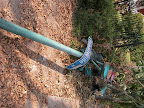
When I say that the songs we listened to at the hostel had a feeling of sickness in them, that doesn’t mean I don’t like them. I did like them, and I still do. The sick feeling wasn’t all in the songs, either. But it was in many songs, and not just the ones for teenagers; you could go to the supermarket and hear it in the Muzak that roamed the aisles, swallowing everything in its soft mouth. It didn’t feel like sickness. It felt like endless opening and expansion, and pleasure that would never end. The songs before that were mostly about pleasure, too – having it, wanting it, or not giving enough of it and being sad. But they were finite little boxes of pleasure, with the simple surfaces of personality and situation.
Then it was like somebody realized you could take the surface of a song, paint a door on it, open it, and walk through. The door didn’t always lead to someplace light and sweet. Sometimes where it led was dark and heavy. That part wasn’t new. A song my father especially loved by Jo Stafford was “I’ll Be Seeing You.” During World War II, it became a lullaby about absence and death for boys who were about to die and kill. I’ll be looking at the moon, but I’ll be seeing you. In the moonlight of this song, the known things, the tender things, “the carousel, the wishing well,” appear outlined against the gentle twilight of familiarity and comfort. In the song, that twilight is a gauze veil of music, and Stafford’s voice subtly deepens, and gives off a slight shudder as she touches against it. The song does not go any further than this touch because the veil is killing and dying, and the song honors killing and dying. It also honors the little carousel. It knows the wishing well is a passageway to memory and feeling – maybe too much memory and feeling, ghosts and delusion. Jo Stafford’s eyes on the album cover say that she knew that. She knew the dark was huge and she had humility before it.
The new songs had no humility. They pushed past the veil and opened a window into the darkness and climbed through it with a knife in their teeth. The songs could be about rape and murder, killing your dad and fucking your mom, and the sailing off on a crystal ship to a thousand girls and thrills, or going for a moonlight drive. They were beautiful songs, full of places and textures – flesh, velvet, concrete, city towers, desert sand, snakes, violence, wet glands, childhood, the pure wings of night insects. Anything you could think of was there, and you could move through it as if it were an endless series of rooms and passages full of visions and adventures. And even if it was about killing and dying – that was just another place to go.
















